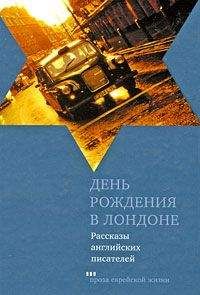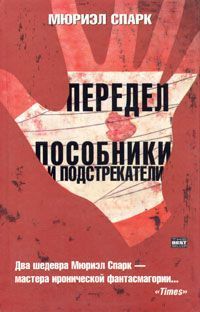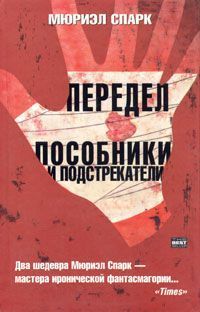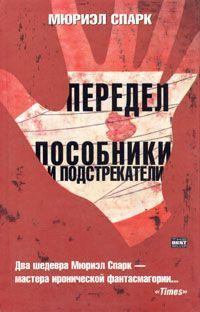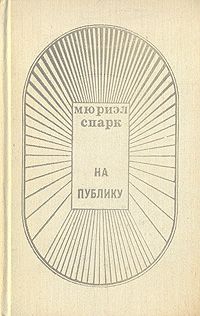Мюриэль Спарк - Английский язык с Мюриэль Спарк (рассказы)
"There aren't any men about," Trudy said.
"There are hundreds of men," Gwen said, in a voice which meant, whatever do you mean?
"I really must try out my phrase-book (я обязательно должна испробовать мой разговорник; really — действительно; to try — пробовать)," Trudy said (сказала Труди), for she had the feeling (так как у нее было чувство) that if she were independent of Gwen as interpreter (что если бы она была независима от Гвен как переводчика; (in)dependent — (не)зависимый, (не)самостоятельный, interpreter — устныйпереводчик) she might, as she expressed it to herself, have more of a chance (у нее было бы, как она определила это для себя, больше шансов: to express — выражать, отражать).
"You might have more chance of meeting someone interesting that way (у тебя будет: «ты возможно будешь иметь» больше шансов встретить кого-нибудь интересного таким образом; way — путь, дорога, образдействия)," Gwen said (сказала Гвен), for their close confinement by the rain (так как их близкое уединение из-за дождя; close — закрытый, близкий, confinement — тюремноезаключение, заточение) had seemed to make her psychic (казалось сделало ее психически чувствительной = экстрасенсом), and she was continually putting Trudy's thoughts into words (и она снова и снова облачала мысли Труди в слова; continually — неоднократно, всевремя; to put — класть).
"Oh. I'm not here for that. (о, но я здесь совсем не для этого). I only wanted a rest, as I told you. I'm not — (все, что я хотела, это отдохнуть, как я и говорила тебе. Я не)
"Goodness, Richard (господи, Ричард!; goodness— доброта, ценные качества; выражает удивление, испуг, возмущение — вот те на! Силы небесные!)!"
Gwen was actually speaking English to a man (Гвен в самом деле разговаривала по-английски с мужчиной) who was not apparently accompanied by a wife or aunt or sister (которого, очевидно, не сопровождала жена, тетя или сестра; apparently— явно, несомненно;accompany— сопутствовать, сопровождать).
He kissed Gwen on the cheek (он поцеловал Гвен в щеку). She laughed and so did he (она рассмеялась, и он тоже: «и так же сделал он»: tolaugh— смеяться). "Well, well (ну, ну)," he said (сказал он). He was not much taller than Gwen (он был не намного выше Гвен; tall-taller-the tallest — высокий, длинный). He had dark crinkly hair (у него были темные вьющиеся волосы; crinkly — кудрявый; морщинистый) and a small moustache of a light brown (и небольшие светловатые усики; light — светлый, яркий, brown — коричневый, карий(оглазах), шатен(оволосах)). He wore bathing trunks (на нем были плавки; bathing — купание, trunks — трусы, swimming trunks — плавки) and his large chest was impressively bronze (и его большая грудь была выразительно бронзовой от загара; to bronze — бронзировать, покрыватьзагаром, загорать). "What brings you here (что привело вас сюда; to bring — приносить, приводить)?" he said to Gwen, looking meanwhile at Trudy (он спросил: «сказал» Гвен, глядя тем временем на Труди).
phrase-book ['freIzbVk] interpreter [In'tq: prItq] confinement [kqn'faInmqnt]
psychic ['saIkIk] apparently [q'pxrqntlI] laugh [lQ: f] moustache [mq'stQ: S]
"I really must try out my phrase-book," Trudy said, for she had the feeling that if she were independent of Gwen as interpreter she might, as she expressed it to herself, have more of a chance.
"You might have more chance of meeting someone interesting that way," Gwen said, for their close confinement by the rain had seemed to make her psychic, and she was continually putting Trudy's thoughts into words.
"Oh I'm not here for that. I only wanted a rest, as I told you. I'm not —
"Goodness, Richard!"
Gwen was actually speaking English to a man who was not apparently accompanied by a wife or aunt or sister.
He kissed Gwen on the cheek. She laughed and so did he. "Well, well," he said. He was not much taller than Gwen. He had dark crinkly hair and a small moustache of a light brown He wore bathing trunks and his large chest was impressively bronze. "What brings you here?" he said to Gwen, looking meanwhile at Trudy.
He was staying at a hotel on the other side of the lake (он остановился в отеле на другой стороне озера; to stay — останавливаться, гостить). Each day for the rest of the fortnight (каждый день /до окончания/ двух недель; rest — остаток, остальное, fortnight — четырнадцатьдней) he rowed over to meet them at ten in the morning (он приплывал на лодке, чтобы встретиться с ними за чаем в десять часов утра; to row — грести, перевозитьвлодке), sometimes spending the whole day with them (иногда /он/ проводил целый день с ними; to spend — тратить, расходовать). Trudy was charmed (Труди была очарована), she could hardly believe in Gwen's friendly indifference to him (она с трудом могла поверить в дружеское безразличие Гвен /по отношению/ к нему; hardly — едва, насилу, to believe — верить, indifference — равнодушие) notwithstanding he was a teacher at the same grammar school as Gwen (несмотря на то, что он был учителем в той же самой школе, что и Гвен; grammar school — средняяклассическаяшкола), who therefore saw him every day (и которая, следовательно, видела его каждый день).
Every time he met them he kissed Gwen on the cheek (каждый раз, когда он встречал их, он целовал Гвен в щеку).
"You seem to be on very good terms with him (ты, кажется, в очень хороших отношениях с ним; to be on good terms — бытьвхорошихотношениях)," Trudy said.
"Oh, Richard's an old friend (о, Ричард, /он/ старый друг). I've known him for years (я знаю его очень долго: «годы»)."
The second week (на второй неделе), Gwen went off on various expeditions of her own (Гвен отправилась на различные экскурсии: «экспедиции, походы» самостоятельно); and left them together (и оставила их вместе: to leave (left) — оставлять, уходить).
fortnight ['fO: tnaIt] charmed [CQ: md] various ['ve(q)rIqs]
notwithstanding ["nOtwIT|'stxndIN, "nOtwID-]
He was staying at a hotel on the other side of the lake. Each day for the rest of the fortnight he rowed over to meet them at ten in the morning, sometimes spending the whole day with them. Trudy was charmed, she could hardly believe in Gwen's friendly indifference to him notwithstanding he was a teacher at the same grammar school as Gwen, who therefore saw him every day.
Every time he met them he kissed Gwen on the cheek
"You seem to be on very good terms with him," Trudy said.
"Oh, Richard's an old friend. I've known him for years."
The second week, Gwen went off on various expeditions of her own and left them together.
"This is quite a connoisseur's place (это место совершенно для знатоков)," Richard informed Trudy (сообщил Ричард Труди), and he pointed out why (и он указал почему; to point out — указывать, выделять), and in what choice way (и каким изысканным образом; choice — отборный, лучший, изысканный), it was so (это было именно так), and Trudy, charmed (и Труди, очарованная), saw in the peeling pastel stucco of the little town (видела в отслаивающейся пастельной штукатурке маленького города; to see (saw; seen) — видеть, смотреть) the unnecessary floral balconies (излишне украшенных цветами балконах; (un)necessary — (не)нужный), the bulbous Slovene spires (луковках словенских шпилей), something special after all (что-то необыкновенное, в конце концов). She felt she saw (она чувствовала, что видела), through his eyes (его глазами: «через его глаза»), a precious rightness in the women (совершенную справедливость в женщинах) with their grey skirts («с их» = в серых юбках) and well-filled blouses (и «хорошо заполненных блузках» = пышногрудых) who trod beside their husbands and their clean children (идущих рядом со своими мужьями и своими чистенькими детьми; to tread (trod; trodden) — ступать, идти).
"Are they all Austrians (они все австрийцы)?" Trudy asked (спросила Труди).
''No, some of them are German and French (нет, некоторые из них немцы и /или/ французы). But this place attracts the same type (но это место привлекает один и тот же тип /отдыхающих/; toattract— притягивать, прельщать, same — тот же самый, одинаковый)."
connoisseur ["konq'sq: ] unnecessary [An'nesqs(q)rI] bulbous ['bAlbqs]
through [Tru: ] precious ['preSqs]
"This is quite a connoisseur's place," Richard informed Trudy, and he pointed out why, and in what choice way, it was so, and Trudy, charmed, saw in the peeling pastel stucco of the little town, the unnecessary floral balconies, the bulbous Slovene spires, something special after all. She felt she saw, through his eyes, a precious rightness in the women with theirgreyskirts and well-filled blouses who trod beside their husbands and their clean children.
"Are they all Austrians?" Trudy asked.
''No, some of them are German and French But this place attracts the same type."
Richard's eyes rested with appreciation on the young noisy campers (взгляд: «глаза» Ричарда покоился с пониманием на молодых шумных туристах; to rest — отдыхать, лежать, appreciation — высокаяоценка, признательность) whose tents were pitched in the lake-side field (чьи палатки были расположены /лагерем/ на поле рядом с озером; to pitch — сооружать, располагаться, lake-side — берегозера). The campers were long-limbed and animal (туристы были подвижны и чувственны; long (длинный)-limbed (limb — конечность, рукаилинога) — длиннорукийидлинноногий, спортивногосложения; animal — животный, плотский) brightly and briefly dressed (одеты ярко и совсем чуть-чуть: «кратко одеты»). They romped like galvanized goats (они шумно возились, как возбужденные молодые животные: «козлята»; to romp — подниматьвозню; to galvanize — гальванизировать, стимулировать, оживлять; a goat — козел, похотливыйчеловек), yet looked surprisingly virtuous (но в то же время выглядели удивительно добродетельно; virtuous — целомудренный).
"What are they saying to each other (о чем они говорят: «что они говорят друг другу»)?" she inquired of Richard (спросила она у Ричарда; to inquire — спрашивать, наводитьсправки) when a group of them passed by (когда группа /молодых людей/ прошла мимо их; to pass by — пройтимимо), shouting some words (выкрикивая /какие-то/ слова) and laughing at each other (и смеясь друг над другом) through glistening red lips and very white teeth (ярко-красными: «блистающими красными» губами и очень белыми зубами).
"They are talking about their fast M.G. racing cars (они говорят о своих быстрых гоночных машинах; M.G. — Morris Garages — британскийпроизводительспортивныхмашинс1924по2005 гг.; racing — относящийсякскачкам, гоночный)."
"Oh, have they got racing cars (о, у них есть гоночные машины)?"
"No, the racing cars they are talking about don't exist (нет, гоночные машины, о которых они говорят, не существуют). Sometimes they talk about their film contracts, which don't exist (иногда они говорят о своих контрактах на съемки в фильмах, которые /тоже/ не существуют). That's why they laugh (поэтому они смеются)."
